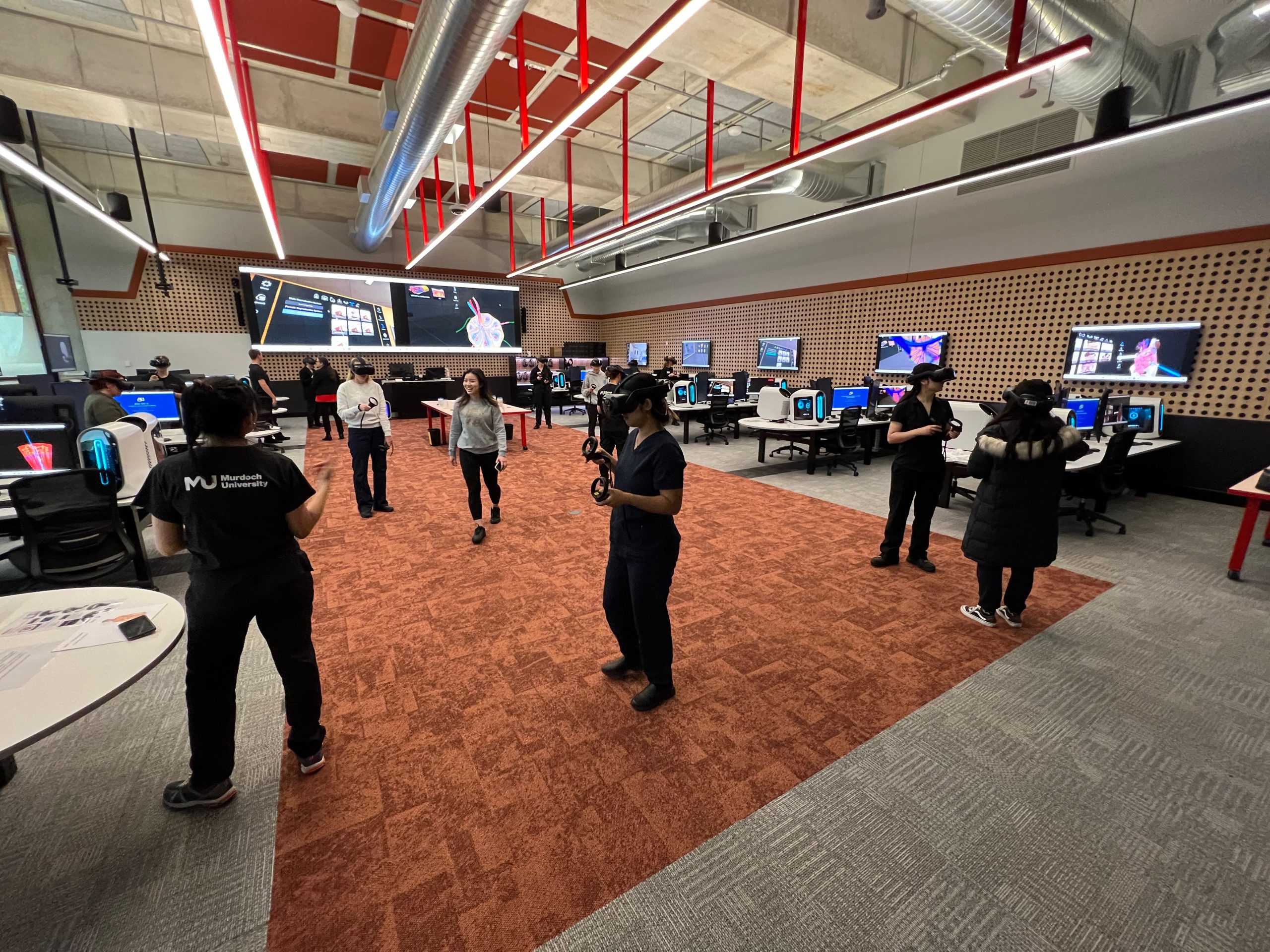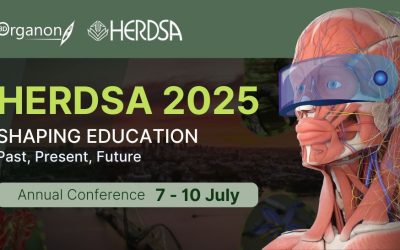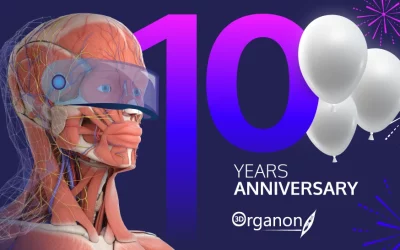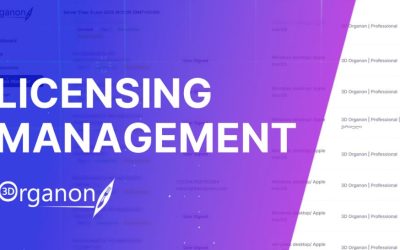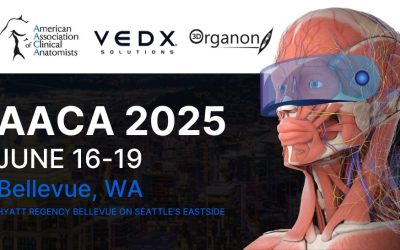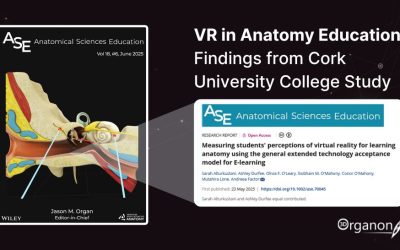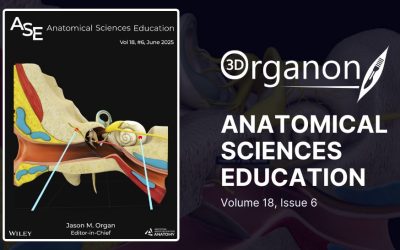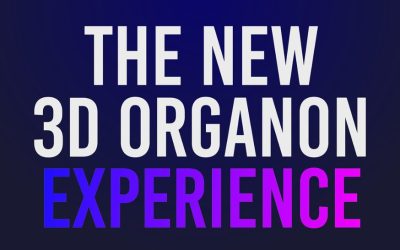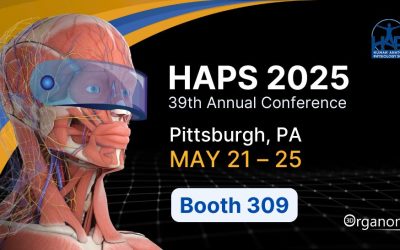The Use of Immersive Technology in Nursing Schools
Learning with Immersive Technology
Nursing education is evolving rapidly, incorporating innovative technologies to enhance learning outcomes. One such technology, 3D Organon, is transforming how nursing students acquire knowledge and skills. By utilizing immersive technology, nursing schools create an engaging, multi-modal learning environment that accommodates different learning styles and prepares students for real-world clinical practice. This paper explores the use of 3D Organon in nursing education, emphasizing its role in anatomy and physiology instruction, clinical training, patient care and professional development.
Anatomy and Physiology
A fundamental aspect of nursing education is mastering human anatomy and physiology. Traditionally, nursing students have relied on cadaveric dissections, plastic models and textbooks. However, 3D Organon introduces a dynamic learning experience through its Immersive Anatomy Module, allowing students to visualize and explore anatomical structures in 3D. They can perform virtual dissections, reinforcing their understanding of structural relationships. Clinical cases and medical imaging provide further context, helping students link anatomy with real-world applications.
Microanatomy and Pathophysiology
Understanding the microscopic structure of tissues and organs is crucial for grasping disease mechanisms. 3D Organon provides interactive models that help students learn about pathogens and their effects on human tissues, study disease progression, and explore pathophysiology through a library of conditions connected to anatomical structures.
Digital Assessments
To reinforce learning, digital formative assessments and spotter exams provide immediate feedback. Immersive assessment platforms such as the Quiz Module and Examverse ensure students engage deeply with the material rather than relying on memorization.
Preparing for Patient Care
Modern healthcare requires digital proficiency. Nursing students trained with 3D Organon gain familiarity with advanced digital tools for patient education and research-based approaches to improve care quality. This training enhances critical thinking skills for making quick, informed decisions in emergencies and strengthens communication skills with patients, families and healthcare teams. Additionally, it fosters empathy and compassion, ensuring patient-centered care.
VR Lab, Murdoch University, School of Nursing, Australia
Clinical Simulations
Using virtual reality (VR), students engage in realistic medical simulations and prepare for real healthcare scenarios. They practice essential nursing skills, such as detecting pain, listening to physiological sounds and understanding pathology through interactive case studies. This digital approach facilitates mastery of Nursing Fundamentals, including wound care, hygiene, mobility and vital signs monitoring. The Search Tool within 3D Organon enables students to incorporate additional learning materials, enriching their study experience.
Tools for Clinical Skills: Pain Tool, Slicing Tool, Growth Tool, Search Tool…
The Ultrasound Module also prepares students for real-case scenarios by providing basic knowledge of ultrasound procedures.
Collaboration and Teamwork
Immersive technology fosters collaboration by integrating large touchscreens and Medverse, a virtual environment where students develop ethical decision-making skills, team coordination and leadership abilities, preparing them for effective patient care.
Academic and Professional Growth
For students pursuing an academic career, immersive technology offers hands-on research opportunities in healthcare and exposure to innovative methodologies in medical education. This prepares them for scientific research and evidence-based practice.
Bridging the Gap Between Educators and Technology
Although today’s students are digital natives, some educators may resist new technologies due to a lack of training. To address this challenge, institutions must implement “Training the Trainer” programs and collaborate with professionals in the field of immersive medical education, such as the team of 3D Organon, ensuring faculty members are equipped to leverage immersive tools effectively. This approach supports a seamless transition to technology-enhanced medical education.
Case Studies and Industry Leaders Advancing Immersive Medical Education
VR Lab Murdoch University School of Nursing
Murdoch University School of Nursing – Integrating a VR Lab Murdoch University in Australia has made significant strides by incorporating a state-of-the-art Virtual Reality (VR) Lab into its nursing program. The lab allows students to engage in interactive, immersive simulations, providing hands-on learning experiences without real-world consequences.
Watch the VR lab in action: Murdoch University VR Lab
Nursing programs at the University of Fujairah
Using 3D Organon for Nursing Education Dr. Jobby George, from the College of Health Sciences at the University of Fujairah in the United Arab Emirates, is leading the charge in using 3D Organon for teaching anatomy within nursing programs.
Watch the Webinar: Lived Experience – VR in Anatomy Teaching and Learning
Nurse to Director of Innovation
From Nurse to Director of Innovation and Redesign Nathan Moore, a nurse from the University of Sydney, has transitioned into the role of Director of Innovation and Redesign. His work centres on pioneering the use of XR technologies, including Virtual Reality (VR), in nursing education. His advocacy for VR-based learning modules is reshaping how nursing students approach clinical education, combining technology with hands-on skills training for better patient outcomes.
Explore Nathan Moore’s work: VR-Based Nursing Education
XR Nursing
Bradley Chesham, XR Nursing Specialist and Advocate Bradley Chesham, a critical care nurse and XR nursing specialist, is an advocate for the use of VR in nursing education.
Watch the Webinar: Anatomy Meets the Metaverse: Innovative Uses of XR for Enhanced Learning in Healthcare
Research and Further Resources
Research continues to highlight the growing impact of immersive technologies on nursing education and the broader medical field.
- Springer Research on Nursing and Immersive Tools: A comprehensive exploration of how VR, AR, and other immersive tools are reshaping nursing education.
- Systematic Analysis of Anatomy Virtual Reality (VR) Apps: A focused study evaluating the effectiveness and potential applications of VR anatomy apps in advanced education. This research underscores the importance of integrating immersive technology into the medical training pipeline to enhance learning outcomes.
Newsroom
3D Organon to Participate in the Annual HERDSA Conference 2025
3D Organon to Participate in the Annual HERDSA Conference 2025 3D Organon is excited to announce its participation in the Annual Higher Education...
3D Organon celebrates 10 years of innovation!
3D Organon 10-Year Anniversary July, 2025 - This month, 3D Organon marks a major milestone: 10 years of redefining medical education through...
The Future of Immersive Healthcare Education ft. Dr Panagiota Kordali I Vodafone Business Interview
The Future of Immersive Healthcare Education: Dr. Kordali Shares Insights in Vodafone Business Interview Vodafone Business, in collaboration with...
3D Organon License Management System
Introducing the New 3D Organon License Management System The New Release of 3D Organon introduces a robust set of licensing tools crafted...
3D Organon to be Showcased at AACA 2025!
3D Organon to be Showcased at AACA 2025! We’re proud to announce that the groundbreaking 3D Organon platform will be featured at the 42nd Annual...
3D Organon Featured in Anatomical Sciences Education Journal: Measuring Student Acceptance of VR for Anatomy Learning
3D Organon Featured in Anatomical Sciences Education Journal: Measuring Student Acceptance of VR for Anatomy Learning Anatomy forms the...
3D Organon Featured on the Cover of Anatomical Sciences Education (ASE)
3D Organon Featured on the Cover of Anatomical Sciences Education (ASE) A 3D Organon model is featured on the cover of the latest issue of...
3D Organon Launches Major Update Featuring AI Study Assistant, Vision Trainer and More
The New 3D Organon Release: Smarter, Faster and More Powerful 3D Organon has officially launched a major update to its leading anatomy learning...
3D Organon at HAPS 2025
Showcasing the Cutting-Edge XR Medical Platform at HAPS 2025 Annual Conference 3D Organon is thrilled to announce its participation in the 39th...
Subscribe to get the latest news!
We promise we don’t send spam
US Office
One World Trade Center, New York City, NY 10007, US
Europe Office
Vas. Sofias, Marousi, Athens, 15124, Greece
Asia | Oceania Office
Township Drive, Burleigh Heads, Gold Coast, QLD 4220, Australia

